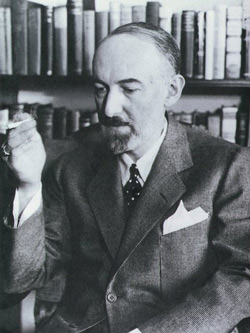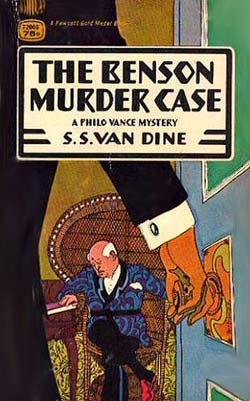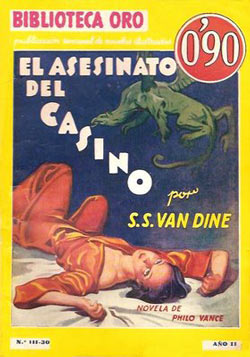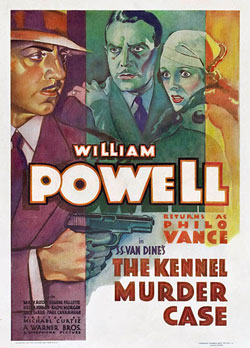
Now, thirty-five years after Mr. Breen’s column and seventy-six years after Van Dine’s death, it’s an unmistakable fact. The pen name of Willard Huntington Wright—who cranked out twelve highly successful detective novels in the twenties and thirties, and saw such esteemed actors as William Powell and Basil Rathbone bring his creation to life in multiple films—has faded from memory. Tastes in mystery stories have changed, certainly, but there’s still an audience for Miss Marple and Lord Peter Wimsey, right? So what happened to Philo?
Here are the basics: Philo Vance is well-educated and very vain about his talents, much like Sherlock Holmes. Also like that other amateur detective, he has a Boswell in tow, this one named Van Dine who records all his cases. Van Dine met Philo while studying law at Harvard. He isn’t sure why Philo Vance would find him interesting, but a few years after graduation, Philo seeks out his old school chum and makes him “personal legal factotum” of all his business transactions. Turns out that Philo had an Aunt who apparently loved him enough to make him the principal beneficiary of vast wealth after she passed away. So now Philo can buy expensive art (Wright was an art critic before turning his hand to writing whodunits) and use his incredible brain to solve cases that befuddle the cops.
 Philo Vance's first case, the Benson murder, is classic in staging. Well-connected Alvin Benson was sitting in a chair reading a book when he was shot in the head at extremely close range. The windows of the room have grill-work over them and are snuggly secured. No one saw the culprit come or go. Found in the room are a woman’s handbag and long white gloves, but Philo swiftly lets the police know they’re wasting their time in seeking her out. Instead he destroys police evidence—after being told not to—by dissecting a cigarette in an ashtray. He keeps his cards close to his sleeve, wandering about with a monocle in his eye, dismissing with a yawn the police’s supplementary findings. And all along conversing in a phony British accent. Philo’s repartee (example: “Circumst’ntial evidence, Markham, is the utt’rest tommy-rot imag’nable.”) was criticized by critics at the time, though the author explains it away in the first chapter as “His slightly English accent and inflection—an heritage of his post-graduate days at Oxford—impressed those who did not know him well, as affectations.”
Philo Vance's first case, the Benson murder, is classic in staging. Well-connected Alvin Benson was sitting in a chair reading a book when he was shot in the head at extremely close range. The windows of the room have grill-work over them and are snuggly secured. No one saw the culprit come or go. Found in the room are a woman’s handbag and long white gloves, but Philo swiftly lets the police know they’re wasting their time in seeking her out. Instead he destroys police evidence—after being told not to—by dissecting a cigarette in an ashtray. He keeps his cards close to his sleeve, wandering about with a monocle in his eye, dismissing with a yawn the police’s supplementary findings. And all along conversing in a phony British accent. Philo’s repartee (example: “Circumst’ntial evidence, Markham, is the utt’rest tommy-rot imag’nable.”) was criticized by critics at the time, though the author explains it away in the first chapter as “His slightly English accent and inflection—an heritage of his post-graduate days at Oxford—impressed those who did not know him well, as affectations.”

Raymond Chandler in his essay “The Simple Art of Murder” cuttingly declared Philo ”the most asinine character in detective fiction.” And more recently, in The Crime of Our Lives, the venerable Lawrence Block, while praising Frederic Dannay and Manfred B. Lee (the duo who were Ellery Queen) wrote, “They took the intellectual puzzle of S.S. Van Dine’s insufferable Philo Vance and elevated it to its highest level.”
Ouch! While it’s true Philo is an insufferable personality, weren’t there plenty of other notably aggravating detectives? Rereading this first entry in the series, I didn’t find Philo Vance specifically the problem, but instead found his second banana sadly lacking in his duties. With Sherlock's Dr. Watson and later Nero Wolfe's Archie Goodwin, we have gophers who obviously admire the men whose lives they are chronicling, but are quick to cut them down to size and expose their shortcomings, especially when Goodwin rips into Wolfe. It helps to deflate some air from these overinflated personalities. But in The Benson Murder Case, Van Dine fawns over Philo to the point of blushing.
S
The Benson Murder Case (1926)
The Canary Murder Case (1927)
The Greene Murder Case (1928)
The Bishop Murder Case (1929)
The Scarab Murder Case (1930)
The Kennel Murder Case (1933)
The Dragon Murder Case (1934)
The Casino Murder Case (1934)
The Garden Murder Case (1935)
The Kidnap Murder Case (1936)
The Gracie Allen Murder Case (1938)
The Winter Murder Case (1939)
S.S. Van Dine image from Michael Mallory's 2006 article on the “Forgotten Sleuth” for Mystery Scene. Spanish language Casino Murder cover via the Detectivesdelibro blog.
Edward A. Grainger aka David Cranmer is the editor/publisher of the BEAT to a PULP webzine and books and the recent Western novella, Hell Town Shootout.
Read all of Edward A. Grainger's posts for Criminal Element.

Listen to JMU’s Brooks Hefner talking about S. S. Van Dine on the radio program “With Good Reason” (based on his _Clues_ article about the unknown pseudonym of Wright that preceded the Van Dine pseudonym):
http://withgoodreasonradio.org/2014/02/brow-anxiety/
My familiarity with the character comes from the Powell movies, but now you’ve got me wanting to try at least one of the novels.
I have a copy of that very edition of The Benson Murder Case, handed over from my father’s old mystery book collection. I’ve had that and a few others on my shelf since I can remember and still have never picked one up, though I’ve long meant to. They sound like fun if taken in the right spirit. Love the movie adaptation of The Kennel Murder Case.
I read all twelve, almost all of them some fifty years ago, and have no desire to reread them. But from memory, the first six (maybe the first seven) are clearly better (or less bad) that the latter ones, and the GRACIE ALLEN case is indeed an unfunny atrocity. The last, THE WINTER MURDER CASE, was still in unpolished (first?) draft when Van Dine died and was published thus; someone (Barzun and Taylor, I think) unkindly said the fact that Van Dine did not get around to “improving” it makes it more readable than most.
I believe it was Ogden Nash who once observed, “Philo Vance/Needs a kick in the pance.”
[b]Elizabeth[/b], I will take a listen. Thank you.
[b]Garnett[/b], Powell was so darn good. I just savored a selection of his films and marveled at what presence he had on film.
[b]Scott[/b], I just learned some interesting film trivia on The Kennel Murder Case via IMDb. Turns out the terrier in the dog show is the same Asta from The Thin Man Series.
[b]Denny[/b], Doesn’t it seem like Van Dine gets dumped on a little too heavily? I guess I will need to continue on with the series to see where all the anathematic feelings originate. But this debut novel works.
[b]Arel 1[/b], An oft quoted put-down for sure.